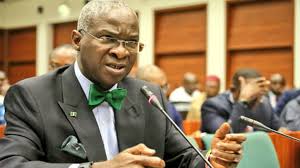Works Ministry to Prioritise Completion of Ongoing Road Projects in 2020 Budget – Fashola
The Ministry of Works and Housing says its 2020 Budget will focus on the completion of some priority road projects, especially roads classified as route A1 to route A9, in the country.
Babatunde Fashola, Minister of Works and Housing, announced this in Abuja on Thursday while defending the ministry’s 2020 Budget before the National Assembly Joint Committee on Works.
Fashola said that the decision to prioritise the roads was hinged on the budgetary allocation to the ministry.
The minister said that the A1 roads to A9 roads were selected from the 540 ongoing projects executed by the ministry.
He said the A1 roads to A9 roads numbering over 80 were strategic roads, connecting states in the six-geopolitical zones of the country.
He said that the roads, when completed, would significantly boost the growth of the economy via improved economic activities.
“These are roads and bridges that lead to ports and major agricultural hubs across the country.
“The ministry has identified some strategic road projects that have already attained some appreciable percentage completion and slated them for completion from 2020-2022,’’ Fashola said.
He noted that the major challenge to the ministry’s effort towards timely completion of projects was insufficient budgetary provision and releases for projects to sustain annual cash-flow requirement levels.
According to him, the total amount outstanding for payment to contractors for duly certified and approved works is N321 billion as at Oct. 15.
He said that the ministry was recommending a stay action on new projects to the committee to complete the old projects as directed by President Muhammadu Buhari in his budget presentation.
Fashola said that the ministry and its parastatals presented a budget proposal of N287, 184,746.31 for capital, personnel and overhead estimates in the 2020 Appropriation Bill.
He added that the 540 ongoing projects being executed by the ministry were categorised based on special funding mechanisms.
He listed the funding mechanisms to include: highway projects financed with Presidential Infrastructure Development Fund (PIDF), highway projects financed with Sukuk Fund, highway projects financed under tax credit and highway projects funded from multilateral loans.
Fashola, while calling for alternative means of funding for projects, advocated the establishment of a national infrastructure bond instrument backed by law.
He said that the bond, when subscribed to by agencies of government, individuals, and investors could be used to finance infrastructure in the country.
In his remarks, the Chairman of the Committee, Sen. Adamu Aliero, APC Kebbi, said that he believed that there were private investors who would be ready to invest in the road sector, given the provision of necessary frameworks by the government.
He said that the investors should be encouraged to construct, maintain and recover their investments before handing over the roads to government.

